Book contents
- Frontmatter
- Contents
- Abbreviations
- List of maps
- List of figures
- List of tables
- Notes on contributors
- Map
- Preface
- Introduction
- PART I
- PART II
- 11 Environmental transformations
- 12 Population and health
- 13 The economy
- 14 Indigenous and settler relations
- 15 Education
- 16 Law and regulation
- 17 Religion
- 18 Colonial science and technology
- 19 Gender and colonial society
- 20 Art and literature: a cosmopolitan culture
- 21 Empire: Australia and ‘Greater Britain’, 1788–1901
- 22 Colonial Australia and the Asia-Pacific region
- 23 The Australian colonies in a maritime world
- Further reading
- Chronology
- Index
- Frontmatter
- Contents
- Abbreviations
- List of maps
- List of figures
- List of tables
- Notes on contributors
- Map
- Preface
- Introduction
- PART I
- PART II
- Further reading
- Chronology
- Index
18 - Colonial science and technology
from PART II
Published online by Cambridge University Press: 05 November 2013
- Frontmatter
- Contents
- Abbreviations
- List of maps
- List of figures
- List of tables
- Notes on contributors
- Map
- Preface
- Introduction
- PART I
- PART II
- 11 Environmental transformations
- 12 Population and health
- 13 The economy
- 14 Indigenous and settler relations
- 15 Education
- 16 Law and regulation
- 17 Religion
- 18 Colonial science and technology
- 19 Gender and colonial society
- 20 Art and literature: a cosmopolitan culture
- 21 Empire: Australia and ‘Greater Britain’, 1788–1901
- 22 Colonial Australia and the Asia-Pacific region
- 23 The Australian colonies in a maritime world
- Further reading
- Chronology
- Index
- Frontmatter
- Contents
- Abbreviations
- List of maps
- List of figures
- List of tables
- Notes on contributors
- Map
- Preface
- Introduction
- PART I
- PART II
- Further reading
- Chronology
- Index
Summary
One of the great aims of the Enlightenment was to shine the light of science on those corners of the Earth that were little known to the European world. Australia and the Pacific provoked particular intellectual curiosity and excitement as parts of the globe yet to be drawn into the Enlightenment's maps of nature. Eighteenth-century exploration of the Pacific had a strong scientific character because, with the growing sophistication of systems of classification and methodology, science was increasingly regarded as the dominant means by which to understand the world and thus control it. The familiar goals of imperial rule and economic advantage were major spurs to Pacific voyaging but the language used to justify such endeavours assumed an increasingly scientific cast. Developments in science and technology in the nineteenth century reinforced the dominance of scientific understandings of the world, especially with the acceleration of the industrial revolution and the rise of Darwinism. Nevertheless, the light generated by science also revealed a world that challenged some of the basic tenets of the Enlightenment. There was pattern and bounty, but nature also emerged as brutal, dangerous and, as the Australian experience attested, surprisingly fragile.
European attention to the Pacific reached new heights in the aftermath of the Seven Years’ War (1756–63), which placed mastery of the New World of North America in British rather than French hands, thus diverting great power rivalry to other possible new worlds in the southern hemisphere. The French absolutist state devoted more lavish resources to scientific enquiry than the British, although both nations’ voyages were intended to advance the frontiers of science as well as those of empire. Cook's Endeavour voyage of 1768–71 had as its most immediate goal participation in the worldwide observation of the Transit of Venus of 1769, with an astronomical base at Tahiti providing a new vantage point.
- Type
- Chapter
- Information
- The Cambridge History of Australia , pp. 438 - 461Publisher: Cambridge University PressPrint publication year: 2013
- 1
- Cited by



